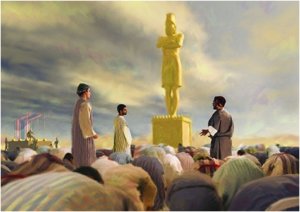 by Rolaant McKenzie
by Rolaant McKenzie
May 19, 2024
Nickaylah Sampson dreamed of following in the footsteps of her parents, Mathias and Natalie Sampson, by pursuing a career of service to her country as an officer in the U.S. Army. In 2020, she was appointed to West Point, one of the most prestigious military academies in the United States, where only about ten percent of applicants are admitted annually.
The following year, as the COVID-19 shot was being mandated at West Point, Sampson and two of her friends, Hannah MacDonald and Willow Brown, chose to follow their Christian convictions and refuse to take it. They held that it was unlawful to be coerced into taking an experimental drug, especially one that they could see was causing serious injuries to young and healthy cadets.
Sampson and her friends experienced increasing levels of ridicule, ostracism, and other forms of punishment for not taking the shot. They were deeply disappointed that while they were making a commitment to protect the freedoms of American citizens and defend the U.S. Constitution, their freedom to choose and their bodily autonomy were being trampled.
While others eventually succumbed to the pressure and took the shot, Sampson and her friends resolved to be faithful to God and trust Him with their future. Like Sampson’s parents, they believed that God honors integrity and faithfulness, and when He closes one door, He opens another.
Sampson, MacDonald, and Brown were able to depart from West Point with an honorable discharge. Michael Harner, Chief Staff Officer of Hillsdale College, a small Christian classical liberal arts college in southern Michigan that operates independently of government funding, heard of their plight and opened the door for them to attend Hillsdale College with a generous scholarship.
 Shadrach, Meshach, and Abed-nego faced a similar challenge to their faith and principles as Sampson and her friends. However, as young men taken captive from the Kingdom of Judah by Nebuchadnezzar, king of Babylon, to be trained as government aides to his kingdom, they could not resign and leave his service.
Shadrach, Meshach, and Abed-nego faced a similar challenge to their faith and principles as Sampson and her friends. However, as young men taken captive from the Kingdom of Judah by Nebuchadnezzar, king of Babylon, to be trained as government aides to his kingdom, they could not resign and leave his service.
When Nebuchadnezzar, seeking to enhance the greatness of his kingdom and the loyalty of his subjects, commanded all his government officials to bow down and worship the golden image he set up in the plain of Dura (Daniel 3) or suffer a fiery death, this ran counter to the belief of Shadrach and his friends that worship should be given to God alone. They chose not to bow to the pressure and rationalize obeying the king’s command, as the majority of their colleagues, even other Hebrews, had done to avoid execution.
Not intimidated by the anger of the king, Shadrach and his friends told Nebuchadnezzar that they would not follow his mandate and that their God was able to deliver them from his fiery furnace. They further said that even if God did not rescue them, they would in no way worship his gods or the golden image. They believed it was far better to be faithful to God, even if their death was the result.
Enraged by the refusal of Shadrach and his friend to accede to his demands, Nebuchadnezzar increased the intensity of the fire seven times and had them thrown into the furnace. But to the king’s amazement, not only were they not consumed, but he saw a fourth Person with them. In this theophany, a pre-incarnate appearance of Jesus Christ, He Himself came to rescue His children.
Shadrach and his friends trusted in the Lord (Daniel 1-2), and He gave them the courage they needed to stand, even though they did not know beforehand that they would be delivered.
Impressed by their faithfulness and integrity, Nebuchadnezzar not only acknowledged the greatness of the God of Israel, but he promoted Shadrach, Meshach, and Abed-nego in the province of Babylon.
Just as Shadrach, Meshach, and Abed-nego learned from their parents the reverence of God and the importance of living a life of undeterred integrity, Sampson, MacDonald, and Brown heard their story from their parents as they grew up and learned the same lessons. They discovered, as they did, that faithfulness to the Lord is not only rewarded in heaven but also can be in this life on earth. They also learned to trust in the Lord, the One who is able to open the way to something better, when the door to their plans was closed.
Many rightfully lament and are disturbed by the rapidly escalating corruption they see in society. Examples include institutions of justice that have degenerated into a legal system that is used as a shield for political allies and favored criminals and a weapon against political opponents and the vulnerable; and executives, lawmakers, and bureaucrats who take bribes to increase their wealth and power and are blackmailed to serve those who bought them to the detriment of the people.
It may be asked, who or what is responsible for this terrible state of society? While we may look at many people and organizations to blame, the truth is that all we have to do is look in a mirror.
In the Bible, leaven is often used as a symbol for sin and corruption that grows over time. In one place, it says, “A little leaven leavens the whole lump of dough.” (Galatians 5:9) As a people, we have gradually drifted away from personal integrity and godly principles. One manifestation of this is that in electing our political leaders, seeking the win for someone from our favored party has taken precedence over whether or not that individual possesses principles and personal integrity. This leavening has resulted in the prevalence of corruption among our political leaders and institutions, with terrible consequences for society.
In His Parable of the Leaven, Jesus used leaven in a different and positive sense. He said, “The kingdom of heaven is like leaven, which a woman took and hid in three pecks of flour until it was all leavened.” (Matthew 13:33) In this case, it symbolized the gospel message and the great impact it has on changing the lives of individuals and society, including instilling steadfast principles and integrity in those who believe in Jesus and follow Him, causing them to choose leaders with integrity who build up society instead of corrupting it.
The integrity exhibited by Shadrach and his friends and Sampson and her friends came from their faith in God, which enabled them to be salt and light in their respective venues (Matthew 5:13-16), even in difficult circumstances. May God cultivate that kind of integrity in us through the power of the gospel of Jesus Christ as we look forward to the “new heavens and a new earth, in which righteousness dwells,” that He will bring (2 Peter 3:13).
© 2024 Rolaant McKenzie – All Rights Reserved
E-Mail Rolaant McKenzie: rolaant@gospeloutreach.net
Website: http://www.gospeloutreach.net/





